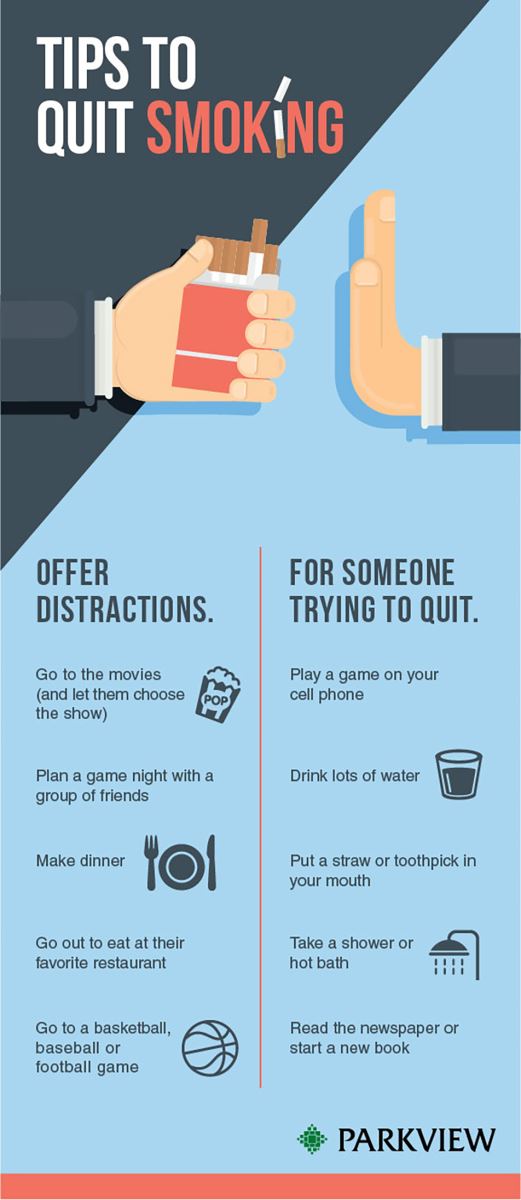Do you have a special someone, or good friend who is working hard to quit? Jan Moore, RRT-NPS, Parkview Community Nursing, tells us everything we need to know, whether we’re trying to quit or support a loved one who is trying to break the habit.
Supporting a loved one.
Someone who feels supported is more likely to quit smoking for good. That’s why friends, family members and significant others can play a big part in helping a person become smoke free. Before offering help, ask if it’s okay to help, and then ask them what you can do. Don’t assume that the person wants your help or that you know the best way to help.
Smoking cigarettes isn’t a bad habit, it’s a serious and complicated addiction. That makes quitting one of the biggest challenges many smokers will ever face. Nicotine is one of the most addictive substances known, more addictive than drugs. Deciding to quit doesn’t mean thoughts of smoking go away at once. It takes time for cravings to fade, and it can take a person more than one try to successfully quit. Most people who quit don’t do it on their own. They need a lot of help and support from friends, family and significant others.
Understanding your relationship with the person trying to quit can help you understand what both of you may have to change to better deal with the process. For example, you may need to:
- Recognize our friend or family member’s small successes when quitting.
- Avoid criticizing them if they slip and have a cigarette.
- Decide it’s time for you to quit smoking, too.
Start the conversation*
It can be tough to get someone to talk about quitting smoking. To get a conversation started, look for an opening. Respond positively when someone says …
“I’m thinking about quitting smoking.”
“My doctor told me that I should quit smoking.”
“I’m pregnant. I should probably quit smoking.”
“My wife is pregnant. I should probably quit smoking for her.”
“My kids are asking me about my cigarettes. I should probably quit smoking for them.”
If someone doesn’t give you that opportunity to talk about quitting, create one. Ask them whether they’ve thought about quitting, or try something like, “I heard on the news that taxes on cigarettes might go up soon. Sounds expensive. What do you think?” or “I saw a commercial last night that showed an ex-smoker who lost teeth from gum disease caused by smoking. I didn’t know that could happen. Did you?”
Then listen.
Asking open-ended questions can help you understand what a smoker who is quitting is going through. You might ask …
“What made you start smoking?”
“What things make you crave a cigarette?”
“What made you decide to quit smoking?”
“What things have been stressing you lately?”
Don’t lecture.
Quitting smoking is about them, not you. Listen to what they have to say. If you ask a question, be quiet and give them time to answer. Resist the urge to insert your own comments. Lectures, nagging and scolding won’t help your friend or family member quit smoking. It might just put you on their bad side, and they may not come to you for help when they really need it. Here are some things to avoid when you’re trying to help someone quit smoking:
- Nagging them about why smoking is bad.
- Counting the number of cigarettes they smoked.
- Asking them if they smoked today.
- Arguing with them about being irritable when they’re going through withdrawal.
- Giving them a hard time if they have a bigger appetite from withdrawal
- Getting upset if they slip and smoke a cigarette.
Offer distractions.
Lend support by helping them plan smoke-free activities, such as:
- Go to the movies (and let them choose the show)
- Take a walk
- Plan a game night with a group of friends
- Make dinner
- Go out to eat at their favorite restaurant
- Sign up for a class like photography, painting or cooking
- Go to a concert
- Go to a basketball, baseball or football game
Smokers usually have triggers, which are things that make them want to smoke. Some triggers and cravings are unavoidable. Ask about the person’s triggers, and see if you can help them avoid their triggers. For example, if the person always smoked during a coffee break, see if they can change what they do on their break, or offer to call them to talk during this time.
For someone trying to quit.
Planning ways to deal with stress is a big help when quitting. Create a plan for cravings by thinking of ways to distract yourself until the craving passes. Cravings only last a few minutes from beginning to end, so making a short phone call, or finding a task to keep keep your hands busy and your mind off smoking, such as:
- Chew gum, slowly eat a piece of hard candy or lollipop
- Play a game on your cell phone
- Put a straw or toothpick in your mouth
- Switch tasks for a change of scenery
- Play with a rubber band
- Munch on some carrot sticks, nuts or celery
- Squeeze a stress ball
- Take some deep cleansing breaths and try to relax
- Use a relaxation CD
- Drink lots of water
- Go outside and blow bubbles, this mimics the deep breathing done while smoking
- Try crossword or Sudoku puzzles or word search books
- Take a 10-minute nap
- Read the newspaper or start a new book
- Take a shower or hot bath
Put together a “Survival Kit” with a few of these items so you’re ready when the craving strikes.

If you slip, don’t panic.
Slips happen. Don’t beat yourself up over it! Like anything tough, you learn as you go. Use that moment as a time to restart and get back on track. Quitting isn’t easy and many people need several tries before they quit for good. Identify the triggers and adjust your routine.
Celebrate successes big and small.
Recognize your smoke-free successes and milestones. Staying smoke-free for one day, one week, or one year are all reasons to celebrate. So are throwing out all of the ashtrays in the house, ditching any reminder of cigarettes, and passing on an after-dinner cigarette.
The challenges of quitting smoking don’t end when you put down that last cigarette. Cravings can pop up weeks, or even months later. It’s not uncommon for ex-smokers to start smoking again within the first three months of quitting. Keep celebrating milestones, practicing healthy distractions and remember, you’re in this for the long haul.




